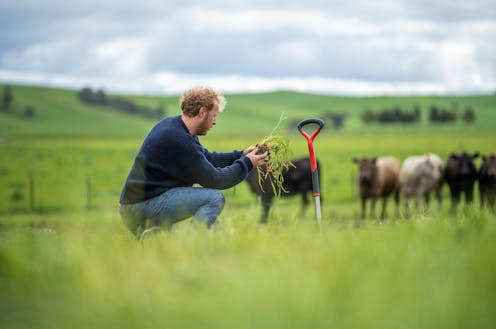Farming cooperatives can get a bad environmental rap, but they can also be a force for good
- Written by Stefan Korber, Senior Lecturer in Innovation and Entrepreneurship, University of Auckland, Waipapa Taumata Rau

It might have surprised some people when the United Nations made 2025 the International Year of Cooperatives[1] and praised the “significant role cooperatives play in advancing the implementation of the Sustainable Development Goals”.
Because cooperatives certainly have their critics. Economically, cooperative principles such as democratic ownership and governance are sometimes linked to inefficiency, low competitiveness and conservative decision-making.
Environmentally, agricultural cooperatives can be portrayed as ecologically suspect and immune to effective regulation. New Zealand’s cooperative dairy giant Fonterra, for example, has been labelled “New Zealand’s worst climate polluter[2]” by Greenpeace due to the methane emissions and effluent its cows produce.
Obviously there is a major political dimension to that argument. But our recent research[3] suggests agricultural cooperatives can also play a positive role when it comes to sustainable development – precisely because of their inherently diverse and democratic structure.
Cooperatives are basically associations of individuals or businesses who voluntarily join to meet common economic, social or cultural needs. Jointly owned and democratically controlled, their profits are distributed among members rather than external shareholders.
We interviewed individuals – from farmers to top-level managers and directors – in three New Zealand agricultural cooperatives. We wanted to shed more light on how their model can work to address one of the most pressing challenges New Zealand faces: sustainable land and water use.
Spreading innovative ideas
The three horticultural and dairy co-ops in our study collectively employ around 800 staff and are part of important value chains that connect New Zealand farmers to foreign markets. Industry experts described them as especially innovative in tackling sustainability challenges.
For decades, industrialised agriculture has exacerbated land degradation by draining natural aquifers for farming, polluting land and water with effluent runoff, and creating food safety concerns about chemical residues.
However, the co-ops in our study have developed methods and approaches to respond to these problems by enabling collaboration between members and external stakeholders. They also leverage some good old “number 8 wire[4]” thinking from their farmers.
First, organised workshops enable members to learn about the latest policy requirements and how customer expectations are changing. Instead of presenting ready-made solutions, the cooperatives support their farmers to experiment with novel ideas in response to identified problems.
Motivated by increased awareness of ecological issues, some farmers came up with pioneering solutions, such as novel effluent systems, that made a positive environmental impact and saved money.
Because of their networked structure, cooperatives can help innovative ideas spread rapidly across the broader membership. Farmers take pivotal roles, acting as champions and “thought leaders” to promote new ideas on roadshows and at field days.
Building collaboration and trust
Secondly, our co-ops ensured solutions developed on the farm held up to scientific scrutiny. They established working groups where researchers from public research institutes collaborated with farmers to develop solutions that worked for everyone.
The most promising ideas even receive funding to conduct on-farm trials to test their real-world application, and that they meet the practical requirements of farmers.
Explaining why getting farmers and scientists in the same room was vital, one cooperative manager told us:
A lot of farmers often see science as purely academic and not practical. So, giving the farmers a say in that whole process is vital. You’ve got to instil that trust […] that’s when you are getting results.
Third, the cooperatives codify novel agricultural methods into best-practice guidelines and audit them regularly. By combining these efforts, cooperatives can achieve widespread acceptance of new farming practices that are scientifically validated but also practical.
Power in the collective
Ultimately, our findings show large-scale sustainable transformation rests on finding ways to orchestrate the efforts of many individuals and organisations towards a common goal.
To be sure, we are not saying some cooperatives and their members don’t also contribute to climate change. But we are suggesting they can play a more positive and proactive role than typically assumed.
A lot of attention these days is paid to investor-owned, multinational corporations that seek to tackle complex challenges with technical solutions. Similarly, small-scale “ecopreneurial” initiatives that make a difference locally often find media and public favour.
But it’s questionable whether single organisations, small or large, can galvanise the large-scale changes contemporary challenges demand.
Cooperatives, on the other hand, are inherently diverse. They can represent the interests of local communities better than organisations controlled by often distant shareholders.
As such, they are ideally placed to coordinate and facilitate the collaborative solutions needed to develop and implement sustainable transformation.
The author acknowledges his colleagues in this research project: Lisa Callagher (University of Auckland), Frank Siedlok (University of St Andrews) and Ziad Elsahn (Lancaster University).
References
- ^ International Year of Cooperatives (social.desa.un.org)
- ^ New Zealand’s worst climate polluter (www.greenpeace.org)
- ^ recent research (ieeexplore.ieee.org)
- ^ number 8 wire (teara.govt.nz)
- ^ Shutterstock (www.shutterstock.com)
Authors: Stefan Korber, Senior Lecturer in Innovation and Entrepreneurship, University of Auckland, Waipapa Taumata Rau







